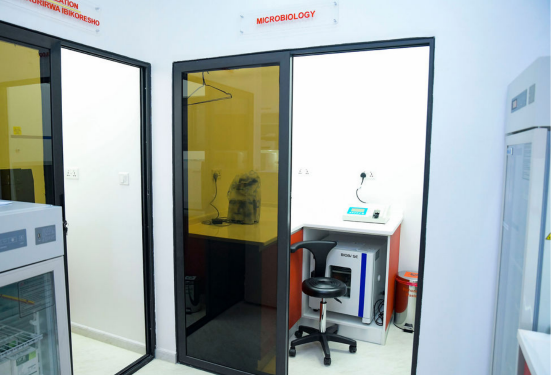Lab Services
Laboratory services are a vital component of healthcare, encompassing a wide array of tests crucial for understanding and diagnosing various health conditions. At Life Care Clinic, we are dedicated to providing comprehensive laboratory services, each tailored to identify and manage specific diseases. Let's delve into the details, including the procedures for sample collection in each category:
1. Routine Blood Tests:
Routine blood tests are fundamental for assessing overall health. They provide insights into red and white blood cell counts, glucose levels, and lipid profiles, aiding in the early detection and management of various conditions.
Diseases Identified: Anemia, diabetes, liver disorders, kidney problems, and cholesterol-related issues.
Sample Collection Procedure: A simple blood draw, typically from a vein in the arm, is conducted. The procedure is swift and minimally invasive.
2. Microbiology Studies:
Microbiology studies are crucial for tailoring effective antimicrobial treatments. Rapid and accurate identification of the causative agent helps in preventing the spread of infections and guiding targeted therapies.
Diseases Identified: Infections caused by bacteria, viruses, and fungi, including urinary tract infections and respiratory illnesses.
Sample Collection Procedure: Depending on the suspected infection, samples may include blood, urine, or swabs from affected areas. These samples are then analyzed to identify the specific pathogen.
3. Genetic Testing:
Genetic testing provides valuable information about inherited conditions, guiding both treatment plans and family planning decisions. It plays a pivotal role in personalized medicine and understanding one's genetic predispositions.
Diseases Identified: Cystic fibrosis, hereditary cancers (e.g., BRCA mutations), and conditions with a genetic predisposition.
Sample Collection Procedure: Typically involves a blood draw or a saliva sample. The collected samples contain genetic material that is then analyzed to identify specific genetic markers.
4. Allergy Testing:
Allergy testing helps individuals identify and manage specific triggers, enabling them to make informed lifestyle choices and receive targeted treatments to alleviate symptoms.
Diseases Identified: Allergic conditions like allergic rhinitis, asthma, and eczema.
Sample Collection Procedure: Skin prick tests involve applying a small amount of allergen to the skin, and a tiny needle is used to prick the skin's surface. Blood tests involve a simple blood draw to detect allergen-specific antibodies.
5. Molecular Diagnostics:
Molecular diagnostics offer high sensitivity and specificity, aiding in the precise diagnosis of infectious diseases and genetic conditions. Early detection through molecular techniques contributes to more effective and timely interventions.
Diseases Identified: Infections at a molecular level (e.g., HIV, hepatitis), genetic disorders, and certain types of cancers.
Sample Collection Procedure: Samples may include blood, tissue, or other bodily fluids, depending on the specific test. Polymerase chain reaction (PCR) is a common method for amplifying and analyzing genetic material.
6. Specialized Panels:
Specialized panels provide a comprehensive overview of specific health concerns, allowing for a more in-depth understanding of complex conditions. This detailed information is crucial for developing targeted and personalized treatment plans.
Diseases Identified: Autoimmune diseases, hormonal disorders, and metabolic conditions.
Sample Collection Procedure: Depending on the panel, samples may include blood, urine, or other specialized collections. The procedure is tailored to the specific requirements of each panel.
At Life Care Clinic, we believe that understanding the nuances of each test and providing additional information enhances patient awareness and fosters a collaborative approach to healthcare. Our commitment is not only to accurate diagnostics but also to empowering our patients with knowledge about their health.

Laboratory services are a vital component of healthcare, encompassing a wide array of tests crucial for understanding and diagnosing various health conditions. At Life Care Clinic, we are dedicated to providing comprehensive laboratory services, each tailored to identify and manage specific diseases. Let's delve into the details, including the procedures for sample collection in each category:
1. Routine Blood Tests:
Routine blood tests are fundamental for assessing overall health. They provide insights into red and white blood cell counts, glucose levels, and lipid profiles, aiding in the early detection and management of various conditions.
Diseases Identified: Anemia, diabetes, liver disorders, kidney problems, and cholesterol-related issues.
Sample Collection Procedure: A simple blood draw, typically from a vein in the arm, is conducted. The procedure is swift and minimally invasive.
2. Microbiology Studies:
Microbiology studies are crucial for tailoring effective antimicrobial treatments. Rapid and accurate identification of the causative agent helps in preventing the spread of infections and guiding targeted therapies.
Diseases Identified: Infections caused by bacteria, viruses, and fungi, including urinary tract infections and respiratory illnesses.
Sample Collection Procedure: Depending on the suspected infection, samples may include blood, urine, or swabs from affected areas. These samples are then analyzed to identify the specific pathogen.
3. Genetic Testing:
Genetic testing provides valuable information about inherited conditions, guiding both treatment plans and family planning decisions. It plays a pivotal role in personalized medicine and understanding one's genetic predispositions.
Diseases Identified: Cystic fibrosis, hereditary cancers (e.g., BRCA mutations), and conditions with a genetic predisposition.
Sample Collection Procedure: Typically involves a blood draw or a saliva sample. The collected samples contain genetic material that is then analyzed to identify specific genetic markers.
4. Allergy Testing:
Allergy testing helps individuals identify and manage specific triggers, enabling them to make informed lifestyle choices and receive targeted treatments to alleviate symptoms.
Diseases Identified: Allergic conditions like allergic rhinitis, asthma, and eczema.
Sample Collection Procedure: Skin prick tests involve applying a small amount of allergen to the skin, and a tiny needle is used to prick the skin's surface. Blood tests involve a simple blood draw to detect allergen-specific antibodies.
5. Molecular Diagnostics:
Molecular diagnostics offer high sensitivity and specificity, aiding in the precise diagnosis of infectious diseases and genetic conditions. Early detection through molecular techniques contributes to more effective and timely interventions.
Diseases Identified: Infections at a molecular level (e.g., HIV, hepatitis), genetic disorders, and certain types of cancers.
Sample Collection Procedure: Samples may include blood, tissue, or other bodily fluids, depending on the specific test. Polymerase chain reaction (PCR) is a common method for amplifying and analyzing genetic material.
6. Specialized Panels:
Specialized panels provide a comprehensive overview of specific health concerns, allowing for a more in-depth understanding of complex conditions. This detailed information is crucial for developing targeted and personalized treatment plans.
Diseases Identified: Autoimmune diseases, hormonal disorders, and metabolic conditions.
Sample Collection Procedure: Depending on the panel, samples may include blood, urine, or other specialized collections. The procedure is tailored to the specific requirements of each panel.
At Life Care Clinic, we believe that understanding the nuances of each test and providing additional information enhances patient awareness and fosters a collaborative approach to healthcare. Our commitment is not only to accurate diagnostics but also to empowering our patients with knowledge about their health.



